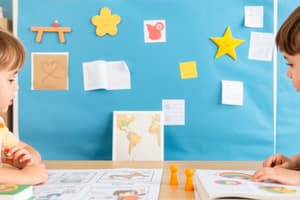Podcast
Questions and Answers
What is the primary purpose of flexible use of space in early years learning environments?
What is the primary purpose of flexible use of space in early years learning environments?
- To promote active, agency-driven collaborative learning (correct)
- To create a structured and rigid learning atmosphere
- To ensure that all activities are adult-led
- To limit the interaction between young learners and adults
Which of the following best describes a characteristic of effective physical environments for young learners?
Which of the following best describes a characteristic of effective physical environments for young learners?
- Layouts that prioritize adult supervision over child agency
- Spaces designed to invite risk-taking and challenge (correct)
- Strict zones that discourage sensory exploration
- Areas designated solely for individual learning experiences
How can young learners be encouraged to reflect on their actions?
How can young learners be encouraged to reflect on their actions?
- By making learning experiences strictly competitive
- By documenting and recording ideas multi-modally (correct)
- By discouraging discussion of their experiences
- By providing only verbal feedback from educators
What role do young learners' voices play in the design of learning spaces?
What role do young learners' voices play in the design of learning spaces?
What is a key strategy to promote positive interactions among young learners?
What is a key strategy to promote positive interactions among young learners?
What is emphasized as a critical aspect for promoting reflection and evaluation in educational settings?
What is emphasized as a critical aspect for promoting reflection and evaluation in educational settings?
Which method is particularly used to gather objective data about program effectiveness?
Which method is particularly used to gather objective data about program effectiveness?
What is the focus of individual child learning evaluation?
What is the focus of individual child learning evaluation?
How can early childhood leaders utilize collaborative reflection effectively?
How can early childhood leaders utilize collaborative reflection effectively?
Which strategy is important for assessing the effectiveness of teaching practices?
Which strategy is important for assessing the effectiveness of teaching practices?
What should be included when reviewing individual child portfolios?
What should be included when reviewing individual child portfolios?
In evaluating program effectiveness, what aspect is crucial?
In evaluating program effectiveness, what aspect is crucial?
What should a teacher focus on during self-assessment?
What should a teacher focus on during self-assessment?
What is the first step in developing the yearly overview and the two-week Forward Planning Document?
What is the first step in developing the yearly overview and the two-week Forward Planning Document?
Which of the following is NOT a method of collecting information about children for planning?
Which of the following is NOT a method of collecting information about children for planning?
How should critical reflection be integrated into the planning cycle?
How should critical reflection be integrated into the planning cycle?
What is the main purpose of analyzing learning during the planning process?
What is the main purpose of analyzing learning during the planning process?
Which question is essential for critically reflecting on observations?
Which question is essential for critically reflecting on observations?
What aspect is NOT considered when analyzing learning dispositions during planning?
What aspect is NOT considered when analyzing learning dispositions during planning?
Which sources of information are important for developing the curriculum?
Which sources of information are important for developing the curriculum?
What underlying belief should guide decision-making when planning the curriculum?
What underlying belief should guide decision-making when planning the curriculum?
What is the primary purpose of collecting data beyond observations?
What is the primary purpose of collecting data beyond observations?
What is one of the guiding questions for critical reflection?
What is one of the guiding questions for critical reflection?
In the learning analysis step, what role does professional knowledge play?
In the learning analysis step, what role does professional knowledge play?
What key aspect should a teacher focus on when planning for future learning?
What key aspect should a teacher focus on when planning for future learning?
During the implementation stage, what should educators aim to align with?
During the implementation stage, what should educators aim to align with?
When reflecting and evaluating a learning plan, what should be assessed?
When reflecting and evaluating a learning plan, what should be assessed?
What is a potential outcome of effective analysis of observations?
What is a potential outcome of effective analysis of observations?
What is the role of structured group work during implementation?
What is the role of structured group work during implementation?
What is the primary purpose of assessment in education?
What is the primary purpose of assessment in education?
Which characteristic is NOT essential for effective assessment?
Which characteristic is NOT essential for effective assessment?
What key feature does a floor book include for documenting student learning?
What key feature does a floor book include for documenting student learning?
How should assessment criteria be presented to students?
How should assessment criteria be presented to students?
What aspect of learning journeys is highlighted in the assessment strategies?
What aspect of learning journeys is highlighted in the assessment strategies?
Which of the following is a benefit of using provocations in learning?
Which of the following is a benefit of using provocations in learning?
What is a critical thinking element included in floor books?
What is a critical thinking element included in floor books?
Which statement best describes the reliability of assessment?
Which statement best describes the reliability of assessment?
What is the primary focus of critically reflecting in educational practice?
What is the primary focus of critically reflecting in educational practice?
Which aspect is integral to the process of reflecting and evaluating learning outcomes?
Which aspect is integral to the process of reflecting and evaluating learning outcomes?
How does critical reflection contribute to professional practice in education?
How does critical reflection contribute to professional practice in education?
What role does children's agency play in the context of educational evaluation?
What role does children's agency play in the context of educational evaluation?
Which question is NOT relevant to the reflection process in education?
Which question is NOT relevant to the reflection process in education?
What is the starting point for evaluating a child's learning?
What is the starting point for evaluating a child's learning?
What does the term 'scaffold' refer to in educational practices?
What does the term 'scaffold' refer to in educational practices?
What is meant by 'big picture' questions in critical reflection?
What is meant by 'big picture' questions in critical reflection?
Flashcards
Data Sources
Data Sources
Collecting information beyond observations to gain deeper understanding.
Enrolment Forms
Enrolment Forms
Basic forms collecting general information about a child.
"About Me" Forms
"About Me" Forms
Forms focusing on child-specific insights and preferences.
Critical Reflection
Critical Reflection
Signup and view all the flashcards
Learning Analysis
Learning Analysis
Signup and view all the flashcards
Professional Knowledge
Professional Knowledge
Signup and view all the flashcards
Planning for Future Learning
Planning for Future Learning
Signup and view all the flashcards
Implementing the Plan
Implementing the Plan
Signup and view all the flashcards
Reflection Cycle
Reflection Cycle
Signup and view all the flashcards
Child Learning Progress
Child Learning Progress
Signup and view all the flashcards
Program Effectiveness
Program Effectiveness
Signup and view all the flashcards
Teaching Strategies
Teaching Strategies
Signup and view all the flashcards
Self-Assessment
Self-Assessment
Signup and view all the flashcards
Professional Development
Professional Development
Signup and view all the flashcards
Collaborative Reflection
Collaborative Reflection
Signup and view all the flashcards
NQS Element 7.2.2
NQS Element 7.2.2
Signup and view all the flashcards
Forward Planning
Forward Planning
Signup and view all the flashcards
Yearly Overview
Yearly Overview
Signup and view all the flashcards
Observation Data Collection
Observation Data Collection
Signup and view all the flashcards
Learning Analysis
Learning Analysis
Signup and view all the flashcards
Professional Knowledge
Professional Knowledge
Signup and view all the flashcards
Curriculum Development
Curriculum Development
Signup and view all the flashcards
Critical Reflection
Critical Reflection
Signup and view all the flashcards
Decision Making
Decision Making
Signup and view all the flashcards
Young Learner Change Support
Young Learner Change Support
Signup and view all the flashcards
Positive Interactions
Positive Interactions
Signup and view all the flashcards
Reflection on Actions
Reflection on Actions
Signup and view all the flashcards
Early Years Learning Environment
Early Years Learning Environment
Signup and view all the flashcards
Diverse Learning Strategies
Diverse Learning Strategies
Signup and view all the flashcards
Critical Reflection
Critical Reflection
Signup and view all the flashcards
Reflecting/Evaluating
Reflecting/Evaluating
Signup and view all the flashcards
Child Agency
Child Agency
Signup and view all the flashcards
Learning Outcomes
Learning Outcomes
Signup and view all the flashcards
Service Philosophy
Service Philosophy
Signup and view all the flashcards
Shared Understanding
Shared Understanding
Signup and view all the flashcards
Unanticipated Outcomes
Unanticipated Outcomes
Signup and view all the flashcards
Educational Practice
Educational Practice
Signup and view all the flashcards
Assessment
Assessment
Signup and view all the flashcards
Floor Books
Floor Books
Signup and view all the flashcards
Learning Journeys
Learning Journeys
Signup and view all the flashcards
Assessment Validity
Assessment Validity
Signup and view all the flashcards
Assessment Reliability
Assessment Reliability
Signup and view all the flashcards
Assessment Authenticity
Assessment Authenticity
Signup and view all the flashcards
Assessment Purpose
Assessment Purpose
Signup and view all the flashcards
Assess child learning
Assess child learning
Signup and view all the flashcards
Study Notes
Exam Overview
- The EDUC2001 exam is worth 30% of the total grade.
- The exam consists of 4 extended answer questions, each requiring approximately 2 pages.
Themes
- Planning processes and considerations in Early Childhood
- Theoretical/philosophical approaches to curriculum
- Child-led pedagogies and associated documentation
- Reflection and evaluation
Question 1: Planning in Early Childhood
- This question assesses the planning process in early childhood.
- The question emphasizes the importance of considering relevant policy and curriculum frameworks.
- Worth 10 marks.
- Sub-Themes:
- System Directives: Planning should align with system-level directives.
- School Directives: Should adhere to school-specific directives and plans.
- Classroom Planning: Focus on practical classroom-level planning.
- Starting Point: Refer to Kindy Guidelines as a starting point.
- Observation and Assessment: Use observation and assessment to inform planning.
- Curriculum Frameworks: Integrate the Australian Curriculum and SCASA frameworks.
- Holistic Approaches: Give priority to holistic approaches to assessment.
Question 2: Curriculum Approaches
- This question requires knowledge of different curriculum approaches.
- Students must choose two out of five approaches and discuss them in detail.
- Each chosen approach is worth 8 marks.
- Curriculum Approaches:
- Inquiry/Project Approach.
- Play-Based Approach.
- Other Approaches
Question 3: Pedagogical Documentation
- This question centers on recording, assessing, and reporting strategies.
- Students need to demonstrate knowledge of a range of pedagogic documentation methods.
- Worth 6 marks.
- Pedagogical Documentation Methods:
- Processes: Educators document learning through methods like Wall stories, Classroom diaries, Floor Books.
- Products: Documentation may involve portfolios, work samples and reports.
Question 4: Reflection and Evaluation
- This question examines the significance of reflection in teaching practice.
- Students need to understand the importance of reflection and the process involved.
- Worth 6 marks.
- The Importance of Reflection:
- Reflective practice helps educators thoughtfully and with integrity respond to complex situations.
- It allows for informed decisions and plans.
- It facilitates the implementation and evaluation of changes in practices and policies.
- It ensures accountability to families, colleagues, and communities for chosen approaches and methods.
- It improves learning for children.
- Reflection within the Teaching Cycle:
- Reflection in action: Occurs during teaching.
- Reflection on action: Occurs after a teaching episode.
- Reflection for action: Informs future teaching practices.
Reflection Levels
- School/center: Reflection at the institutional level.
- Classroom: Reflection by individual teachers within their classrooms.
- Self: Personal reflection by educators on their own practices.
Studying That Suits You
Use AI to generate personalized quizzes and flashcards to suit your learning preferences.




